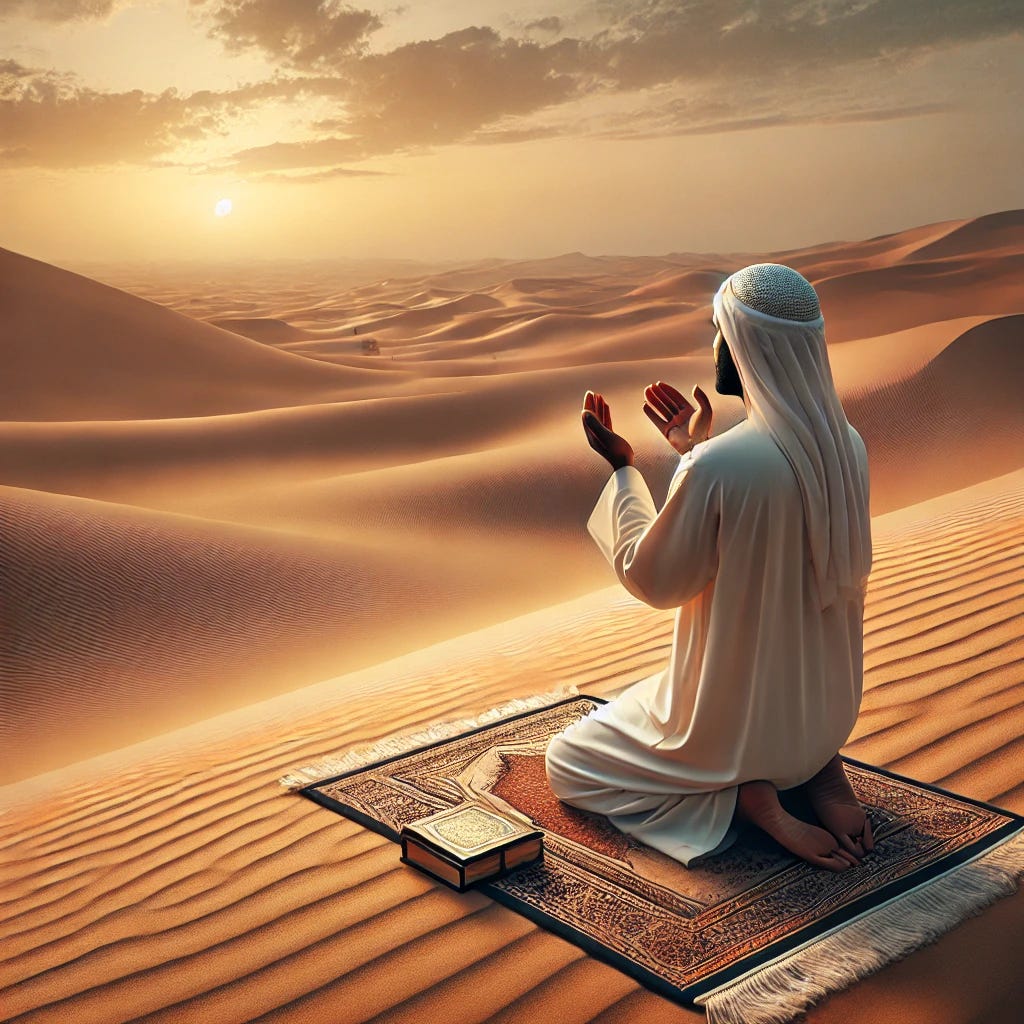(Note: This is Part 1 of a two-part article series. This one discusses “Do we truly know Allah” while the second one will focus on “How can we know Allah”. Please don’t forget to read the Dua at the end as well. JazakAllah for reading and your support!)
In the depths of our hearts, we profess love, devotion, and reliance on Allah. We recite His names in prayer, seek His help in hardship, and strive to fulfill our duties as His servants. But amidst the rituals and routines, have we ever paused to ask ourselves: Do we truly know Allah? To know Allah is not merely to acknowledge His existence; it is to deeply understand His names, attributes, and actions. It is to experience the transformative power of His mercy, the overwhelming awe of His greatness, and the comforting certainty of His wisdom. Without this knowledge, our worship risks becoming mechanical, our love superficial, and our faith fragile. So, the question “Do we truly know Allah?” is not just rhetorical. It is foundational to our relationship with Him and the essence of our purpose in life.
The question, “Do we really know Allah?” pierces the heart, forcing us to confront the depth of our relationship with our Creator. It demands introspection, a recalibration of our priorities, and an acknowledgment of the void that exists between our rituals and the essence of worship.
Knowing Allah: A Harmony of Mind and Heart
Knowing Allah is both an intellectual exercise and an endeavor of the heart, with each complementing and enriching the other. Intellectually, understanding Allah involves studying His names and attributes as revealed in the Qur’an and Sunnah, reflecting on His signs in creation, and contemplating His actions and wisdom in our lives. This reflection highlights the role of intellectual exploration in building a foundation for recognizing Allah’s majesty and mercy. Such knowledge sharpens the mind, providing clarity about the Creator and deepening the believer's awareness of His greatness.
However, knowing Allah transcends intellectual understanding. It is ultimately a journey of the heart. The heart internalizes what the mind comprehends, transforming knowledge into love, awe, reliance, and a profound connection to Allah. It is in the heart that the truths of Allah's mercy bring tears of gratitude, His greatness evokes trembling humility, and His closeness offers unparalleled comfort during life’s trials. The heart feels what words cannot express, recognizing Allah's presence in moments of silence, beauty, and despair, forging a bond that transcends reason and resonates with the soul's deepest longing.
The Qur’an frequently addresses the heart, as in the verse:
“Indeed, it is not the eyes that are blind, but the hearts in the chests that grow blind” (Qur’an 22:46).
Ibn Taymiyyah reinforces this, explaining that the true knowledge of Allah is felt when the heart aligns with its Creator, experiencing the joy of proximity and the tranquility of submission. While the intellect lays the groundwork, the heart solidifies the bond, making knowing Allah a deeply spiritual experience that shapes both belief and action.
How Can We Worship Allah Without Knowing Him?
How can we be sincere to Allah in our devotion and ibadah if we do not truly know the One we are worshiping? Ibn al-Qayyim eloquently stated in Madarij as-Salikin, “The heart is purified through sincerity to Allah, for it cannot serve two masters.” But sincerity in worship is impossible without a foundational understanding of Allah’s majesty, mercy, and perfection. How can we bow in sujud in awe, stand in gratitude during salat, or raise our hands in du’a with humility if our hearts have not grasped even a fraction of who Allah is? Worship devoid of knowledge risks becoming hollow movements, a duty unanchored from its purpose.
The Foundation of Tazkiyat un-Nafs
Tazkiyat un-nafs, or the purification of the soul, is the essence of Islamic spirituality. It is the struggle to cleanse the heart of arrogance, greed, and heedlessness, replacing them with humility, sincerity, and love for Allah. But how can the soul be purified if it does not know its Rabb? Ibn al-Qayyim reminds us, “The veil between the servant and his Lord is the impurities in his heart. Removing them unveils the knowledge of Allah.” Purification begins with a yearning for Allah, a desire to align one’s soul with its Creator. This yearning can only be cultivated through understanding who Allah is by reflecting on His Asma’ul Husna (Allah’s Names), His attributes, and His actions.
How Can We Love Allah Without Knowing Him?
Loving Allah is the cornerstone of iman, the lifeblood of a believer’s connection to their Creator. Prophet Muhammad (may the peace and Allah’s blessings be upon him) said,
“None of you will truly believe until Allah and His Messenger are more beloved to him than anything else.” Source: Ṣaḥiḥ al-Bukhari 15, Ṣaḥiḥ Muslim 44
But love requires knowledge. We cannot truly love what we do not know.
Ibn al-Qayyim beautifully articulated this reality: “The more a servant knows Allah, the more he will love Him, obey Him, and turn to Him.” When we reflect on Allah’s mercy as Ar-Rahman, His wisdom as Al-Hakim, and His forgiveness as Al-Ghaffar, our hearts are drawn to Him. Love for Allah is not abstract; it is cultivated through understanding His perfection and His continuous blessings upon us.
The Concept of Tawakkul: Trust Built on Knowledge
Tawakkul, or placing trust in Allah, is a deeply beloved concept in Islam. It represents a believer’s reliance on Allah’s plan, wisdom, and mercy in all matters. But how can we place our trust in someone we do not know? How can we submit our fears, hopes, and anxieties to Allah if we do not understand His ability to manage our affairs better than we can?
Knowing Allah as Al-Wakeel (The Trustee) and Ar-Razzaq (The Provider) transforms tawakkul from a passive notion into an active state of trust and peace. Ibn Taymiyyah said in Majmu’ al-Fatawa, “Whoever relies upon Allah with complete trust will find contentment because he knows that Allah’s decree is rooted in wisdom and mercy.” This trust stems from knowing Allah’s attributes, reflecting on His promises, and internalizing His greatness.
Trials and Remembrance: Leaning on Allah
In times of trials, we instinctively turn to Allah for help. We seek solace in sabr (patience), dhikr (remembrance), and du’a. Yet, our reliance on these acts is only as strong as our knowledge of Allah. How can we truly ask for His mercy if we do not understand Him as Ar-Rahim (The Most Compassionate)? How can we persevere with patience if we do not trust Him as Al-Hakim, the One whose wisdom governs all decrees?
Ibn al-Qayyim reminds us in Madarij as-Salikin, “The one who knows Allah understands that every decree is filled with wisdom and mercy, even if hidden.” Without this knowledge, our trials become heavier, and our patience wavers. Knowing Allah gives meaning to hardship and transforms it into an opportunity for growth and nearness to Him.
Remembering Allah: A Relationship Rooted in Knowledge
The value of dhikr cannot be overstated. The Qur’an commands us repeatedly to remember Allah in all states. But how can we remember someone we do not truly know? Remembrance that flows from understanding is more profound, more transformative. Ibn al-Qayyim said, “The heart becomes illuminated with the remembrance of Allah, and this light leads to knowing Him.” To remember Allah properly, we must know Him - His majesty, mercy, and nearness.
How to Know Allah: A Timeless Path
Scholars like Ibn al-Qayyim and Ibn Taymiyyah have emphasized methods to know Allah, drawing from the Qur’an and Sunnah. These include reflecting on His Asma’ul Husna (His names), His attributes, contemplating His creation, studying the Qur’an, engaging in sincere ‘ibadah, observing His decrees in life events, and purifying the heart. We will discuss these in detail in the next article.
Conclusion: A Call to Action
The journey to know Allah is the most profound endeavor we can undertake. It is the key to purifying our hearts, deepening our ‘ibadah, and finding peace in this life and the next. Let’s reflect on His Asma’ul Husna, study His signs, and seek Him through dhikr and sujud. Ibn al-Qayyim said, “True happiness lies in knowing Allah and finding joy in Him.” The more we know Him, the more we will love Him, trust Him, and find solace in His presence. Let’s begin this journey today.










Jazaakumullahu khayran, this is more than eye opening, it touches the heart and calms the mind
Once again, jazaakumullahu khayran for this amazing piece